Food Storage Lessons From WWII
When it comes to food storage, we can learn a lot from the lessons of WWII. During WWII, people had to survive on war rations, which made feeding a large family very difficult, especially if you were on a tight budget. Despite these difficult times, people endured, and today, preppers can learn important food storage lessons from the people who lived through WWII.
War Rationing
Can you imagine feeding a family of 6 during war rationing in the 1940s? Back then, prepping wasn’t something that was talked about very much, but many people did it without even thinking about it. And, those who didn’t have food stocked up had to make do with very little.
In the United States, the government began rationing certain foods in May of 1942. They began by rationing sugar, then coffee, and by March of the following year, meats, fats, canned fish, cheese, and canned milk were all added to the list.
With war rationing used at that time, they had a point system, and you could only get a certain amount of points for various food items. When you used all your points for say meat, you couldn’t get any more until the following month.
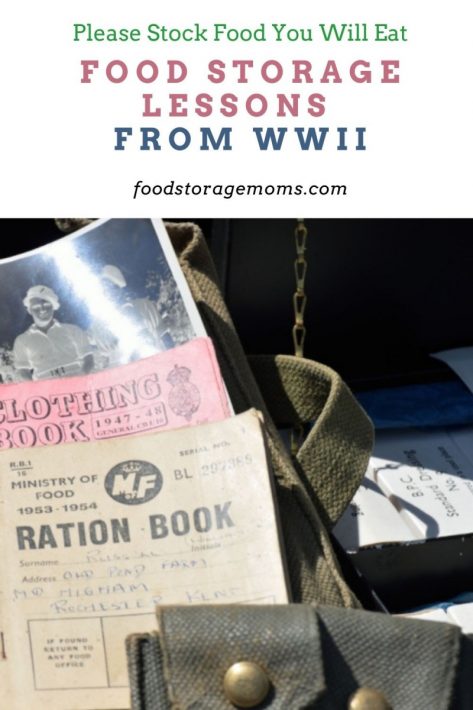
Food Storage Lessons From WWII That Are Still Useful Today
We can learn a lot from history, and it can help us to be better prepared for the future. Here are just a few food storage lessons from WWII that are still useful today:
Canned Goods Are Your Friend
Canned fruits and vegetables, as well as canned meats, were a staple of the WWII diet. They are shelf-stable and easy to store, making them ideal for long-term food storage. On most of these cans, you will notice that the USDA recommends its shelf life right around 2 to 5 years, but if you store it right, it can last even longer. Here are the Canned Foods I Highly Recommend You Store.
I’ve talked about case lot sales a number of times. Mark and I rely a lot on those sales, and they seem to come to our local stores most often in the fall. We love to stock up on soups especially, but also get cases of corn, beans, peas, and other veggies, along with a variety of fruits. I use cream of chicken soup in so many recipes! My preferred brand is Campbells, you just can’t go wrong with their quality and competitive pricing.
We haven’t made a habit of buying many canned types of meat, but I do like the canned chicken breast and tuna from Costco. During the summer we’ll make lots of sandwiches and make either tuna salad or chicken salad mixtures. Top that off with fresh tomatoes from our garden and you’re in canned meat heaven.
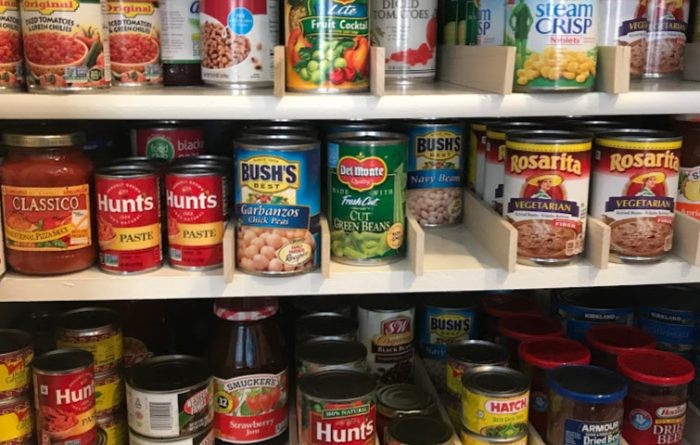
Store What You Eat and Eat What You Store
This is one of the most important food storage lessons that we can learn. If you store any foods that you don’t like to eat, then you’ll be less likely to eat them in an emergency too. And, if you only eat foods that you have stored and they aren’t your favorites, you’ll get tired of them fast, or you’ll open them up but let them go to waste because family members don’t like them
I recommend storing a variety of food items that you enjoy eating. This way, you’ll be more likely to eat them in an emergency and you won’t get bored with them as quickly or see food spoil in the fridge.
In addition, it’s important to store nutrient-rich foods. This will help ensure that you’re getting the nutrition your body needs in case of an emergency. Some good examples of nutrient-rich foods include fruits, vegetables, meat, fish, and whole grains.
Store Food in a Cool, Dark Place
When storing your food, it’s important to keep it in a cool, dark place whenever possible. This will help preserve its quality and extend its shelf life. Food that is stored in higher temperatures or humid environments can spoil much faster. Food that is stored in airtight containers and kept in a cool, dry place will last for many months, if not years.
Properly Store Your Food
You want to store your food so that you keep oxygen and moisture out, which can cause your food to spoil. For example, store flour in sturdy metal cans, or sealed containers with oxygen absorbers to keep insects like weevils out. Beans, rice, and pasta need to be stored in airtight containers. You can store dried food in Mylar bags, and then keep the bags in sealed containers.
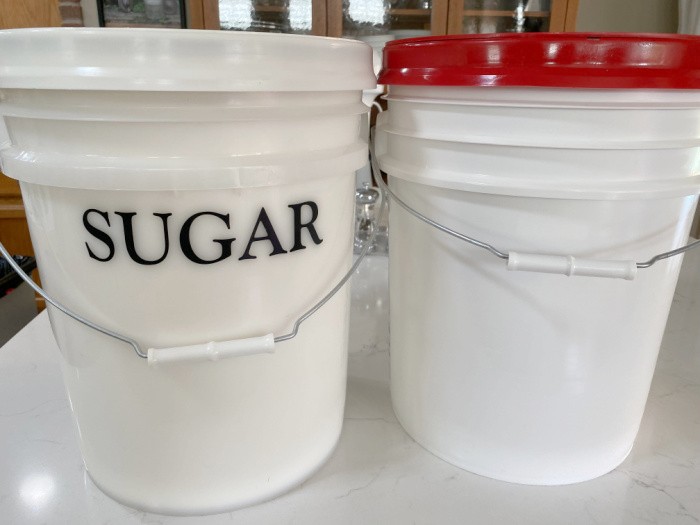
Invest in Items to Barter
During WWII, it wasn’t just about food either. There were rations on other items such as gas, tires, automobiles, and other necessities. If you have a large family, you would benefit from stocking up on other supplies you can barter with like alcohol, tools, clothes, and even skills we all need from time to time. What could be bartered back then may not be what is useful today, but there certainly are many similarities to the basic staple we need from generation to generation. Be sure to check out these 50 Items You Need in Order to Barter, in today’s world.
Stock Up On Other Essentials
You will also need to stock up on other essentials like prescription medication, pet food, and cleaning supplies. If a situation ever arises where you can’t leave your home, you’ll be happy you have as many items as you can store and continue using them on a daily basis. Paper products are critical because we will use less water. Please stock paper plates, cups, paper towels, and garbage bags.
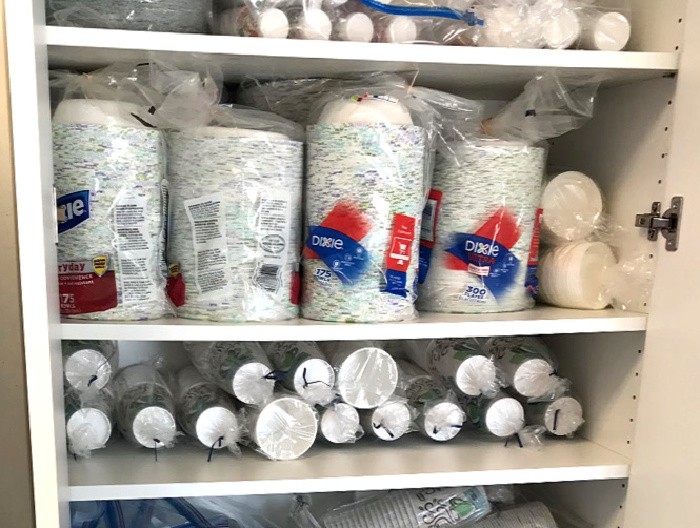
Label Food Storage Containers
It’s important to label food storage containers with the date the food was packaged. This will help you keep track of how long the food has been stored. If you can’t tell what’s inside the container, be sure to label that information too.
It’s also important to rotate your food supply regularly so that it doesn’t go bad. Try to use the oldest food first, and then replace it with fresh food. This will help you to keep your food storage fresh and avoid wasting any food, and the related money used to buy them.
Every few months, check the expiration dates on your food and put those items with pending expiration dates on the menu. If you have items that have expired, consider throwing them away so you don’t get sick from eating them. We used to use the “smell” test to see if food could still be eaten. Those expiration dates are there for a reason, so eat them at your own risk! When you buy new food, put it at the back of your pantry so that you’ll use the older food first. This way, nothing should go to waste.
These are 2-gallon buckets with vinyl lettering. I buy my 2-Gallon Buckets from Pleasant Hill Grain. Gamma Lids for 2-Gallon Buckets
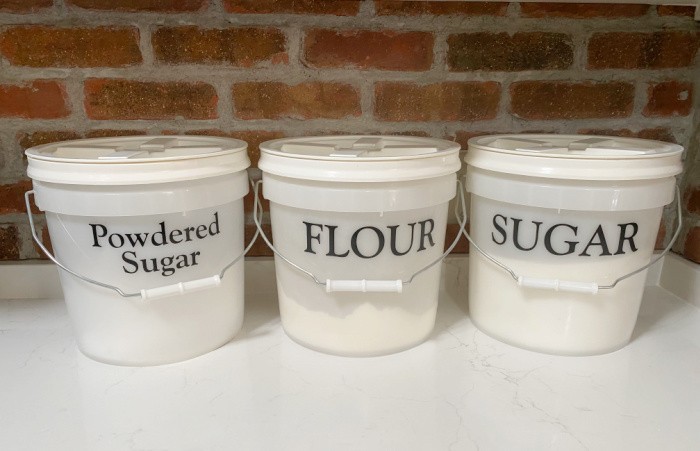
Make a Food Plan
It’s important to have a plan for what you’re going to eat in case of an emergency. This will help you to make sure that you have enough food to last, and that you’re not eating the same thing every day. When you make your food plan, try to include foods that are high in protein and calories, so that you’ll be able to sustain yourself for a longer period of time.
Get the kids involved in making the plan so they have a vested interest in not only having enough as they grow older but there will be items on the shelves that they like.
Store Food in Multiple Locations
If something happens and you can’t get to your food storage, it’s important to have food stored in multiple locations. This will help ensure that you have access to food no matter what. Maybe you can partner with good friends and family members to help store each other’s food. That way, in most cases, the food will be available in time of need. It would be good to have that extra food a reasonable distance away so the chances of the emergence affecting all parties involved are minimal.
Keep a 72-Hour Kit
In case of an emergency, it’s important to have a 72-hour kit. This kit should include enough food and supplies for you to survive for 72 hours. Be sure to include things like water, non-perishable food, a flashlight, and a first aid kit. 72-hour kits are good if you have to bug out. It ensures you have food, water, and necessities while you are on the road. You should have a kit for every member of your household.
Don’t forget any special issue items for your kids and any elder members of your family. Also, those pets need to be looked after too. Make sure your 72-hour kits are located so everyone knows where they are and as easily accessible as possible. You don’t want to be looking all over for them or have them in the attic where they’ll be tough to get to in a rush.
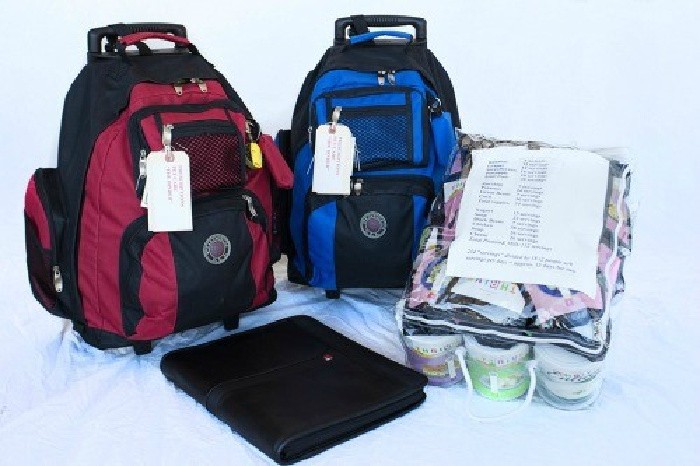
Keep Your Stockpile a Secret
If you have a stockpile of food, it’s important to keep it a secret. If people know you have food, they may try to take it from you. It’s also important to store your food in a safe place where it’s hard to locate for those unfamiliar with your home’s layout.
If your neighbors come and ask for help in a survival situation, you can give what you have to spare, but don’t talk about your stockpile with strangers, and don’t let on how much you actually have with anyone but family members you can trust. You don’t want those who didn’t prepare to loot your house.
Grow Your Own Food If You Can
One of the best food storage lessons of WWII is that you can’t rely on the stores and government to get the food and supplies that you need. When it comes to taking care of your family, one of the best things you can do is have a self-sufficient garden.
Even if you don’t have a lot of space, you can plant a garden in containers or raised beds. You can also grow food indoors by using hydroponics or aquaponics. Learn as much as you can about growing your own food and put it into practice. It will take some effort, but it will be worth it in the long run.
Be Prepared to Go Without
Although it’s not ideal, sometimes you may need to go without as much food as you’re used to. During WWII, there were times when people went without food for days at a time. If this happens, you’ll be glad you stocked up on non-food items like water, batteries, and candles so you can still survive as long as possible.
Food Storage Lessons From WWII
Final Word
These WWII lessons have taught us that we never know when there won’t be enough to go around. The best thing we can do is start prepping now before a war or another emergency happens that could prompt some food rationing to take place. History is there for us to learn from so that we are best prepared in case a similar situation confronts us down the road, but only if we act now and not wait until it’s too late! May God Bless this world, Linda
Copyright Images: WWII Ration Book Depositphotos_95165696_S

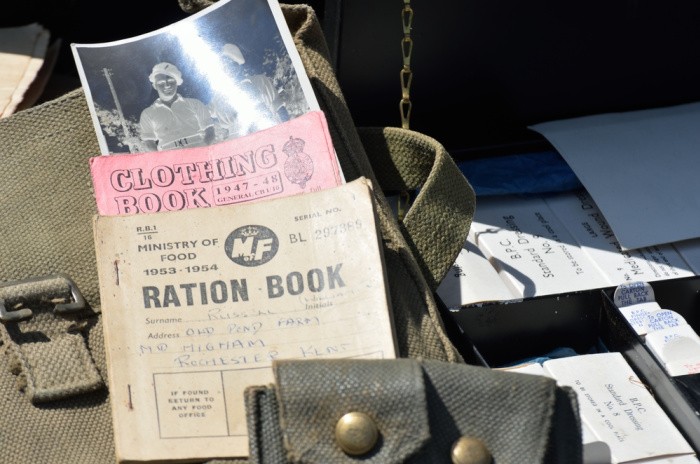

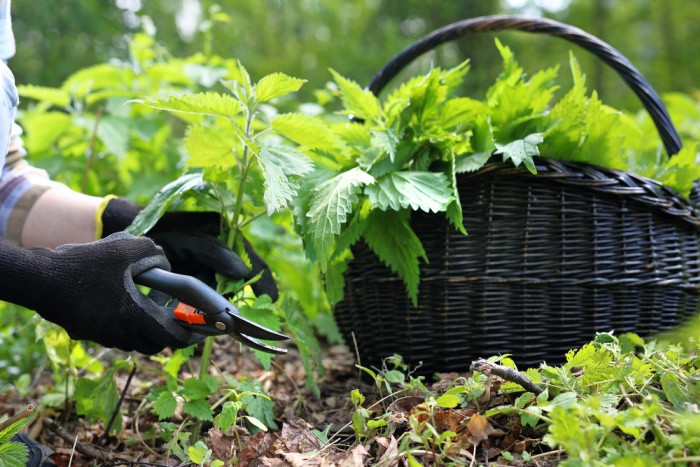
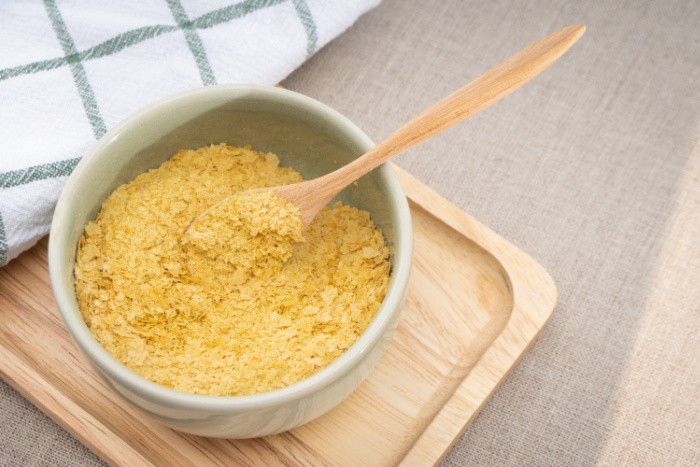
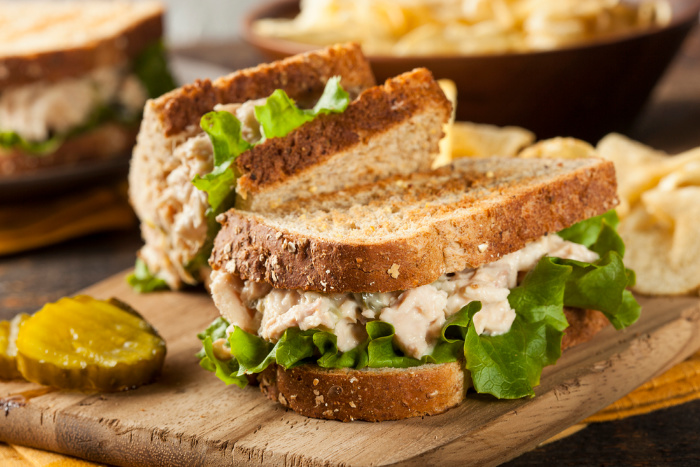
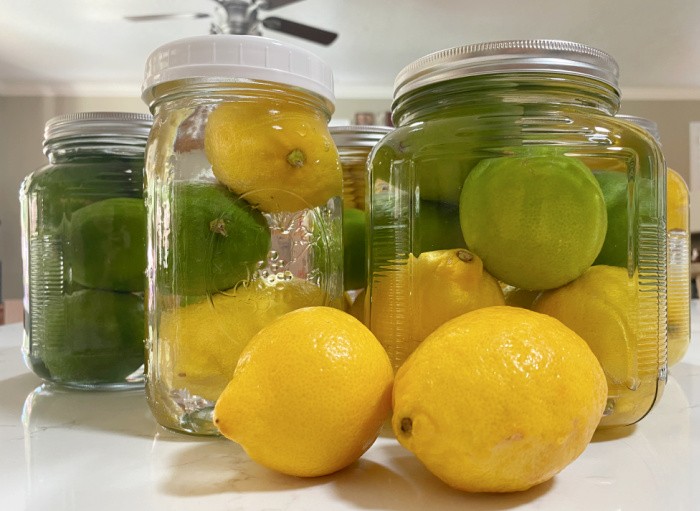
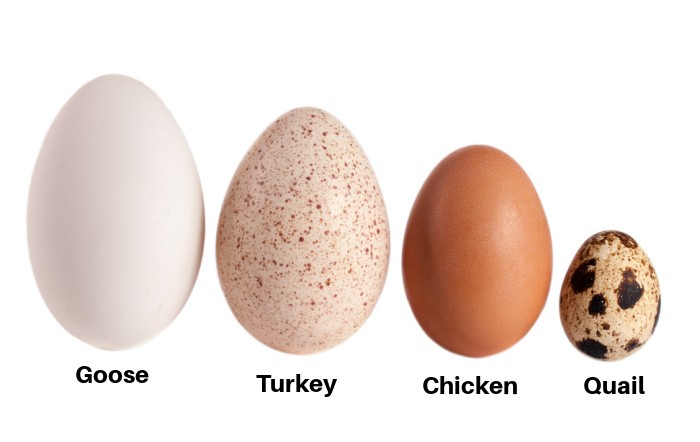
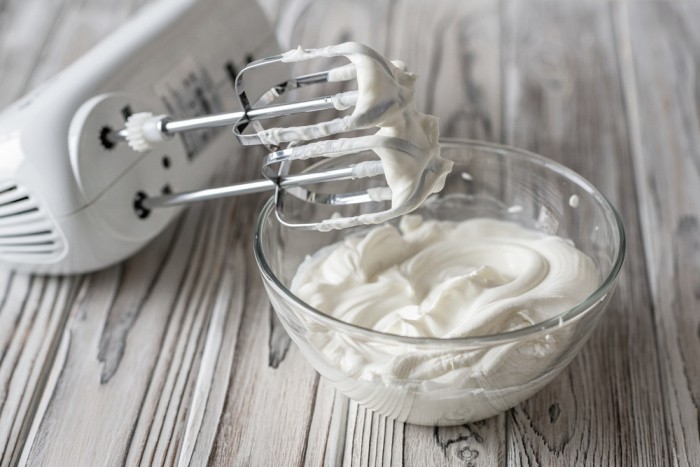













Right on target for the times especially with POTUS stating “there will be food shortages”. You know it’s bad when a politician admits it. This globalization is biting us.
Put up pasta and Frosted Flakes in Mylar yesterday. Recently added 3 pullets to flock, head out Thursday to pick up 2 steers to raise and got my container garden at the house ready and completed the garden at the family farm by building a deer fence around it. Both families have been raising seedlings so we are ready in a few weeks to plant.
I know most folks don’t have the opportunity I do but most everyone can buy an extra can and set it back. Most everyone can raise a tomato in a bucket.
Do what ya can with what ya got. Stay safe
Hi Matt, I love hearing this!! Way to go, my friend! I’m in the middle of building my new small home. Not sure where I can plant anything. But, believe me, I will use garden bags if I have to until I can build some raised gardens. We must produce some of our food. Good job with your family, Matt! Linda
Spunk mentions what didn’t work for him and his family. From your writings, it is apparent you have been prepping for some time. Could you please share with those of us, not so far on this journey, some of the things that DIDN’T work for you so we don’t make the same missteps.
Hi Chris, are you asking me or Spunk? I have been prepping 50+ years (I’m 72). Linda
I’m sorry Linda, I should have been clearer. I thought since you have been prepping so long, maybe you could tell us what didn’t work, so we don’t make the same mistakes
Hi Chris, okay, gotcha. I will write a post with some ideas. I think that’s a great idea. Linda
Linda, I was recently taken to task, and I wish to apologize for any inference that you had made any missteps. I certainly never intended to question your wisdom. Please forgive me. I am now going back to my corner, where I will remove my foot from my mouth.
Hi Chris, oh I didn’t take it like that all my friend. No apology is needed. It’s interesting the different things I have been thinking about since you mentioned that. I’m actually excited to post about things I have seen and items I have purchased that I wish I hadn’t. I love the idea, actually! Linda
I understand the need to garden and produce food but also at the same time, it takes a lot of resources, effort, and money. We invested a lot of time and money over two years to try to have a garden and it turned out to be frustrating and not productive. First year only half of our plants produced anything, second year, half the plants got eaten by a woodchuck, and then the rest developed a fungus. Personally our property is not good for growing because the soil is mostly clay and very gritty. We will have to shift to using buckets with soil to grow tomatoes and peppers in. I’ve been saving cat litter buckets that will be washed and then re used for growing. Will it be pretty or Pinterest Pefect? No. But I refuse to spend hundreds of dollars on a container garden for my patio. The rest will have to come from the farmers market.
Julie, please don’t give up on gardening in your soil. I helped a friend to change her garden from one that produced little to one from which she was selling her extra produce. It does take initial work but once done, is good for many years. Sort of self-perpetuating and starting small works too. Basically dig a trench about 12-18 inches down, leaving the clay soil on the walkway. It will pack down. Get kiddie sand, some compost, some black dirt, peat moss and fill in that trench. Your clay soil will form the sides. The clay soil will also hold moisture in the trench. If you can get some grass clippings, leaves, wood shavings, throughout your growing season, add these even as your plants are growing. My friend wanted tomatoes, so her hubby found a guy with chickens. They cleaned out his small chicken coop, brought home that compost, put on top of soil where tomato trench was. We did a trench each for tomatoes, peppers, onions and green beans. The next year she trenched more: cukes and peas grown together, cantaloupes and pumpkins. She’d struggled for years and had never had anyone suggest this. It’s called sunken beds.
Hi Wendy, thank you for this great reminder you mentioned the other day. I love it!!! Linda
Julie don’t give up. Stay the course. You’ve learned a lot on the first attempt.
Wendy is dead on target. We are fighting red clay at the farm garden. In a 50×50 we’ve move several tons of compost, hay, manure, chicken poop and wood chips into the soil to unbind the clay so plant roots won’t get choked out.
As far as the woodchucks yup you gotta protect the garden from EVERYTHING. We had to build a fence that would stop free ranging chickens and deer. It’s 6ft topped with barbed wire.
Self Reliance isn’t about easy it’s about skill, knowledge and determination. It’s a lifestyle not a hobby for glory. Forget about social media. That’s not a reason to do this. Egos will fail you.
Every single year folks across the nation get sick from contaminated food harvested with less than ideal methods. I know where my lettuce has been.
Anyone can buy stuff
Till you can’t
Hi Matt, I LOVE LOVE LOVE your comment. We must not give up. Keep trying and learn new skills. You are so right, “Anyone can buy stuff,
Till you can’t”. Best comment EVER! Love it! LInda
Matt, thanks! I have sugar sand so my issues are different yet struggles when we start out are the same. Having these groups for help/advice would have saved me from a lot of failures, lol. And, while I do little gardening now (due to health and family changes), I’m glad to share what I learned. You give a lot of great advice so I wish I’d had you as a resource way back then. Trial and error is pretty frustrating. Um, the lady I helped has emailed me once a year since…she is now teaching her friends to garden.
That’s awesome
Hi Julie, oh I hear you on the clay soil. I had it in Southern Utah. It is very expensive in the beginning to get the garden soil where we need it. First of all, critters are a nuisance. I had desert rats, they were hard to get rid of, woodchucks would be too! Here’s the deal, we can only do what we can do and let it go. By this I mean, if you have a Farmer’s Market near you, that is awesome! I will have to frequent those this summer as well. Linda
Linda, my folks and relatives said they were mostly affected by rationing of gas, tires, and coffee. Most of their food was homegrown, meat was raised by them, plus they hunted and trapped. Mom said they were so used to being poor that ration amts was all they ever could afford anyway . Of course they lived in or by small towns so this was true for most of this group. I imagine rations were very hard for city people.
Hi Wendy, my relatives who lived through WWII are all gone now. I wish I could ask them. Thank you for your insight. I grew up poor and so did my husband. We didn’t realize HOW poor until years later. But, the good thing is we learned a lot about being poor and survival. Linda
Linda, I think I only have 2 relatives alive who went thru the Depression so I’m glad my mom was a storyteller. After mom died, my dad became the storyteller. In my 20’s I took a vacation up where my grandparents homesteaded, met with a lot of the old-timers, recorded their stories of life in the turn of the century and thru the years of strife. Unfortunately, my cassette tapes were destroyed in my house fire. As to my childhood , I didn’t really understand the idea of being poor: most everybody around us were too! I saw a fb posting from one of my friends the other day: they had a neighbors dog who decimated their hens. Brought on a memory from when we took in a stray dog, and one day he simply went berserk, killing almost all my mom’s meat chickens. As a kid, I was horrified at the carnage. As an adult who raised butchering chickens, this insult would have been hard to take, but I was Not counting on those birds to feed my family for the next year…as was my mom. I do remember that winter we ate a lot of beans and rarely had meat.
Hi Wendy, oh wow, what a story! Your mom counting on those chickens would break anyone’s heart. I remember having cassettes, wow, the memories!! What a fun vacation to go and visit the old homestead. Love it, Linda
Thank you for the feedback and encouragement on this. One of the other thoughts that runs in my mind is we have a split rail fence that lines one side of our property, and want to take it down. We might take the lumber from it and re-use it to build around our existing garden, reinforce it to keep the woodchucks out, and then add in soil/compost/peat moss. I was really frustrated after last year and had zero help from my family.
Hi Julie, it is frustrating when you are doing the gardening alone. A couple of years ago we had zero bees. Then I realized if I planted some flowers the bees would come to pollinate my plants and it worked. I hand pollinated for 2-3 years with a paint brush, that works, but bees work better! LOL! Every year we learn something in gardening that we will or will not do the following year. Give it try, one or two plants. Ask the local nurseries which tomatoes “work” in your area. That will make a big difference. I always plant 2-3 different varieties of tomatoes. The first one is always Early Girl because it produces faster than others. There is nothing better than the first tomato from the garden. Do what you can and buy from the Farmer’s Market as well. Linda
Julie, this type fencing might help but like Matt said, you have to figure on critters. What I did was get free pallets from any and all places/people. Got bent concrete rods, warped deck railing posts, whatever I could for free, and some steel fencing posts I paid for, used the pallets as a barrier fencing. Kind of wierd but it seemed that if the rabbits, woodchucks, chickens, even deer, couldn’t See my garden, they left it alone. Before I did this, I’d just used chicken wire fencing so they’d tunnel under, fly over, jump over? The trick is, get creative for cheap, almost free protection for whatever garden you do. And, I include container gardening in this. Last summer I did container gardening on my deck…heard a noise…there were frickin rabbits on my deck, up on their hindlegs, having a great breakfast of my tomatoes and peppers. Raising our own food is not for the feint of heart but is well worth it.
Yes, great advice. This month I have been teaching the sisters at church about what they need to grow in each season, what to plant in smaller areas and decks, pots and 5 gallon buckets and what a Victory Garden is and how it is so necessary in 2022. I have given them a lot of info. and it has been very well received. I know that much of what I give to them goes to many other places in the country and that is great. Whatever we can do to help families and individuals at this time is important. Many have gotten chickens, etc. to help to offset egg prices around here that has jumped to almost $7,00 a doz. for organic eggs. Anything we can do to help and teach is so important at this time.
I remember my grandmother talking about the rationing during WWII. She said they were fortunate because her parents lived with them and they plowed up the backyard and it was planted as a “victory garden”. The side yard was where the chicken coop was kept. My grandmother and great-grandmother were both wonderful cooks (yes, I knew my great-grandmother!) so always had fresh bread and eggs, chicken and the produce from their garden. They lived in a tiny town here in Kansas and everybody did the same thing with gardens, etc. They bought beef from a local rancher and no one went hungry there. Gram said they were poor but never hungry which is a real blessing.
Hi Paula, oh, I LOVE this story. I was lucky enough to know my great-grandmother as well. She died when I was about 17 or 18 years old. But, I have wonderful memories of her. The Victory Garden is a good one to remember. I wrote a post about having one. Having a garden, plus some beef, and chickens was truly a blessing. Great comment, thanks for sharing! Linda
Linda, you have such great suggestions, based on experience!
You mentioned you don’t buy canned meat products. I have found something that I think is so good. I always
keep Vienna sausage on hand for emergency meat. Now usually they are so so but if your hungry they are o.k.
I use to buy BBQ ones just to change things but one day I found Burbon BBQ and oh my gosh to me these are so
much better. I actually ate them right out of the can, I usually put them in the fridge to cool them down but these
were so good. The next time I went to Walmart I made sure I bought 3 or 4 more cans. it might be something you can try that is different. Hey in a emergency they aren’t bad.
Julia don’t give up on your garden. Mine I had to give up in ground gardening because of my health. I do have a garden in buckets, and flower pots but I would love to go back to in ground gardening. I picture my mom’s and grandma’s garden and I look at mine and it is so sad but I never gave up. Their garden were like that because they never gave up. If you do get chicken manure let it “cool off” before using it as fresh will cook your plants.
Hi June, oh my gosh, I grew up eating Vienna Sausages!! Oh, and Spam. I forgot both of those!! Thanks for the reminder! Linda
I’m so lucky living near a lot of corporate farms where they grow year round in Florida. I have been able to stock up with buying culls and seconds and canning them. With the promise that fertilizer is skyrocketing, I wonder if all these farms are going to continue planting. It might not be worth it to them. I’m really happy I already have a nice variety from them, but recently I wonder if I should try to grow food myself. It was easy…no weeding necessary: buy a bushel at deep discount of whatever was in the field and overlooked or blemished slightly or they planted too much…but now I will be watching the fields and seeing if they continue to plant.
HI Debbie, wow, you are really lucky! What a great idea you have been able to take advantage of. I’m concerned more about our food chain than ever before. The thing that will save us is the fact that we can cook from scratch. Linda
Debbie, they probably will continue to plant but may not do giveaway or deep discount for imperfect produce? The best produce will be bought, sold under name brands. The imperfect will be bought by these same canning co’s, sold under generic names. I noticed this already the last year. Also, more water in the cans than in the past, whether name brand or generic. You might want to try just a couple of trenches in your yard…one for bush green beans, one for a couple varieties of tomatoes, one for spinach/chard/greens? Wierd but you can plant onions under these. Make the most of what space you have.
I learned this from my parents and Mother & Father in Love who lived through WWII. Both sets of parents grew their own food and saved it for the year. They also had food at the end of the year that would be eaten before the garden came in. It is the only way to live
I also forgot too mention that we need to learn from all the wars that our country has gone through. There are many places you can find recipes that although we would not think of them they will keep us alive.
Hi Jackie, that’s a great comment and so true. Cook with less meat, cook from scratch. Grow a garden or buy from a Farmer’s Market. If you have a cow, pig, or some chickens you will be one step ahead of the game. As long as you can feed them. Linda
Hi Jackie, I have always canned my harvest and then started over the next year. I learned the same thing from my parents. We will get through this, one step at a time. Linda
My grandparents had a combination storm cellar and root cellar. That cellar was full of home canned vegetables and fruits from their 2 acre garden and their orchard. They also has sand filled bins full of potatoes. Here in AZ it’s hard to find a cool dark place (cool should be near 50 F) for best results. If you have a root cellar consider yourself blessed. Hey, even if you have a basement you’re very lucky.
Hi Ray, we used to have a basement years ago. Looking back, I sure took it for granted. I won’t have one in the new small house either. I would love a storm shelter or root cellar. That would be awesome. Hey, on a side note, I went to visit Smith’s for a case lot sale and the prices were normal. They were not marked down. Before you drive to one, check with someone. Linda
There’s no case lot sale at our Smith’s right now, but thanks for the heads up.
Hi Ray, I want to let you know if you drove to LV. Linda
Okay, got it and thank you. No trips planned yet.
Thank you Ray, for bringing back a memory I had long forgotten. My grandfather built cupboards in the basement that my grandmother kept stocked with fruits and vegetables from their garden. I always thought they had that because they were wealthy. I learned to make applesauce, canned tomato, bread and butter pickles and sauerkraut. Onions, peppers, mushrooms and celery were diced and frozen. A full canning cupboard always brought a sense of security
Hi Chris, thank you for sharing, I used to make bread and butter pickles!! Yum!! Linda
My husband has not objected to my overstocked pantry, as long as it is things we normally eat. The idea of canned meat isn’t going over too well so far. I thought maybe a package of Starkist chicken made into sandwiches with his favorite Miracle whip might be a good place to start. Your thought on the envelopes of tuna and chicken as good as canned??
Hi Chris, tuna, in general, goes mushy after a couple of years. It’s still edible but I don’t care for it. I tend to buy less tuna than any other canned meat. I would doubt the tuna or chicken envelopes would have a good shelf-life. I don’t know for sure, I would look and see the expiration dates. Costco canned chicken is really good. So is the Costco canned roast beef. You can make shredded tacos or whatever with it. It tastes great. I grew up on ground roast beef sandwiches as well as ground corned beef sandwiches. I hope this helps, Linda
Hi Linda, I appreciated your article as it does remind us as to what was in short supply in WWII. I have read many articles listing prescription drugs to be stockpiled, but no one ever suggest ways to do accumulate them. Since they are prescription drugs, you need a prescription to get them. Do you or your readers have any ideas on how to do this?
The only way I have found so far is to have your sympathetic doctor prescribe a pill that has double the amount of meds that one needs. Store half the pills away, cut the remaining ones in half and use as directed. Any other ideas would be welcome as some doctors would not do this.
Alan, first I would suggest calling you insurance company and suggest you may be out of town and you would like an extra 30 day vacation supply. If that fails, I learned when the 2000 was supposed to be the end of life as we knew it, that most insurance companies allow refills 5 days before due date, 5 days early every month equals 2 months. If all else fails, call your doctor and seek his or her wisdom.
Hi Chris, oh thank you, I used to ask for vacation prescriptions from my family doctor. I forgot about that. Great reminder. Linda
Hi Alan, let me explain what I do. Or I should say, I used to do this until my prepper doctor got Alzheimer’s. I know my doctor like a best friend. I only go to the doctor once a year. I went to this doctor for over ten years. I have been to his home several times. We would discuss prepping ideas. I only went for blood tests to get one prescription renewed for the year. You cannot do this at an InstaCare type medical center. First of all the doctors do not know you. You stop in with a cough, fever, or whatever. They can prescribe a prescription for that illness. Possibly a follow-up visit if need be. But, you may never see that doctor again. You need a relationship with a doctor that understands you just want antibiotics for a UTI (bladder infection) or some other ailment you get often. I get a prescription plus 3-5 refills. I never asked for pain pills, only Ibuprofen which is cheaper with a prescription (800 mg.) I ask for 3 Z-packs (sinus infections). I also have some for Cipro (it stops Anthrax). I pay cash for all of my prescriptions. I never use my insurance and they are cheaper than my co-pay. Linda
What I have learned is that if you buy large quantities of food and rotate it, your always eating almost stale food. I learned this when I accidentally put fresh cans of food in the wrong spot. Yes, I have been feeding my family almost expired food for years. I went out and bought a freeze dryer and now I have over a years worth of food that will last from 3 to 30 years. I also don’t have any anxiety about prepping and my family eats fresh food now. If you can afford it, it’s the holy grail of food storage. Good luck folks and be kind to one another.
Hi Spunk, great comment, thank you! Linda
Linda, both you and Chis gave some good ideas to get extra prescription drugs for their preps. I figure a lot of readers will benefit from those suggestions. Thanks.
Hi Alan, I sure hope they help someone. Linda
I think that people had a much easier time adjusting to WWII rationing since it came about not long after the Great Depression. At least my parents didn’t have much of an issue with rationing. Of course, they also lived on a large farm, raising their own meat, eggs, milk products as well as having a huge garden and local fruit available (note, my folks lived at a fairly high elevation and fruit did not produce well on their farm – not that they didn’t try!). What my parents taught my siblings and me was to always have a back up plan – storage, money on hand, etc. I am at a point in my preps where I do not have to panic! I have food storage and I constantly rotate my short term foods, then replace as I use them. I don’t normally dig into my long term storage unless I absolutely need to (i.e. I am broke!). When I say that “I am broke”, I am not technically broke but cannot or do not want to go out shopping!!
When it comes to gardening, I am not doing very well. I live in an apartment with a balcony that gets some sun in the mornings through late afternoon. I have tried to grow in pots but have not had much success. I bought into some of the “growing” methods and they just did not work for me. But, I keep trying! I have been much more successful with growing micro-greens and sprouts for fresh greens.
As for prescription medications, I have some on hand but in a SHTF situation, it will not be enough I am sure.
Hi Leanne, it feels great to be prepared as much as possible. I’m like you, I will not use my long-term food storage until I REALLY need it. It’s so expensive now, I wouldn’t buy most of it. Of course, food, in general, is overpriced. Hang on for the ride, we will survive. Linda
Got to thinking about this post a bit more. I know that we primarily think about food, water, medications when we talk about prepping but there is so much more. For example, we need to KNOW how to do things/make things that might not be available to us. I think that people in the past had knowledge that we have lost in the last, I don’t know how many years.
I stop and think of all the convenience items like shampoo, conditioner, toothpaste, lotions, etc., that we wouldn’t want to be without. Of course, knowing how to make these things also takes storing the ingredients to make them if we need to. My daughter makes homemade tooth powder and I must say that no toothpaste I have ever used makes my teeth feel as clean and polished as her homemade powder does. I’ll have to have her send me the recipe so I can share it (I just make her give me some when I am nearly out). My dentist also says that my plaque build up has lessened significantly since using this toothpowder.
The other day, I ran very low on my favorite body butter (I get it at Trader Joe’s) and I was rushing out to get some! I decided that since I already know how to make my own body butter and I have most of the ingredients, I should just make my own but…
We need to stop and think about all of the things we use on a daily basis and make sure that we have those items in our storage or the ingredients to make them if a disaster hits. It will sure make our days a bit brighter if we can continue to maintain our sanity – I don’t want dry cracked hands if things get really hard or items are out of stock or not to be had at any price.
Hi Leanne, I agree, we must know how to make some of the things we use daily. I would love your daughter’s toothpowder recipe. I think everyone should know how to make it. We all stock dozens of toothbrushes!! LOL! We need good toothpowder or paste. Love this, Linda